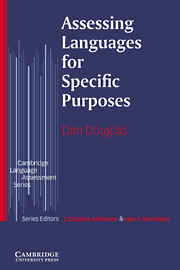Book contents
- Frontmatter
- Contents
- Series editors' preface
- Acknowledgements
- 1 Why test language for specific purposes?
- 2 Specific purpose language ability
- 3 Context, discourse domains, and task characteristics
- 4 Strategic competence: between knowledge and context
- 5 From target language use to test tasks
- 6 Specific purpose tests of listening and speaking
- 7 Specific purpose tests of reading and writing
- 8 LSP test development and technology
- Appendix: other LSP tests
- References
- Index
2 - Specific purpose language ability
Published online by Cambridge University Press: 03 May 2010
- Frontmatter
- Contents
- Series editors' preface
- Acknowledgements
- 1 Why test language for specific purposes?
- 2 Specific purpose language ability
- 3 Context, discourse domains, and task characteristics
- 4 Strategic competence: between knowledge and context
- 5 From target language use to test tasks
- 6 Specific purpose tests of listening and speaking
- 7 Specific purpose tests of reading and writing
- 8 LSP test development and technology
- Appendix: other LSP tests
- References
- Index
Summary
Introduction
In this chapter I will review research on the nature of communicative language ability, and summarize our current best understanding of this complex concept, including a discussion of background knowledge in specific fields of interest. The goal is to work toward a clearer understanding of the construct of specific purpose language ability, for that, of course, is what we are attempting to measure with LSP tests. I will especially consider the relationship between language ability and specific purpose background knowledge. This is an important issue, for if language is learned in communicative contexts – and there is much evidence to suggest that this is so – then it follows that those contexts must affect the very nature of the language that is thus acquired. Chapelle (1998) points out, in an elaboration of what she calls an interactionist view of construct definition, that merely taking into account both the traits of the language user and the features of the context is not enough; rather, we must allow for the interaction between the two. This inevitably means that the quality of each changes: ‘Trait components can no longer be defined in contextindependent, absolute terms and contextual features cannot be defined without reference to their impact on underlying characteristics’ (p. 43). This notion suggests that there is such a thing as specific purpose language knowledge, and that the nature of language knowledge may be different from one domain to another.
Information
- Type
- Chapter
- Information
- Assessing Languages for Specific Purposes , pp. 24 - 40Publisher: Cambridge University PressPrint publication year: 1999
